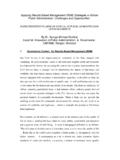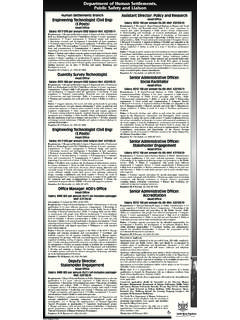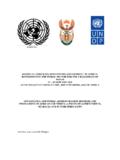Transcription of 5 Human Resource Development A Challenges - …
1 Ministry of Justice JUSTICE VISION 2000 Flve Year Nat~onal Strategy for Transforrn~n~ the Adrn~n~strat~on of Just~ce and State Legal Affa~rs I I 5 Human Resource Development A Challenges All the people who in the iustice system will have to work together to achieve the objectives of Justice Vision 2000. Every ' employee will have to be: i I Well trained Professional i Sensitive to peoples' different cultural experiences Sensitive to peoples' different gender experiences i Respectful of everybody's dignity and Human rights ! Responsive to different peoples' needs Oriented towards excellent customer service t i i The full Development of our Human resources is a major challenge. Our Human Resource Development policy will have to i make the best use of our limited resources, and at the same time, foster a culture of continuous Development and learning. Training Aside from experience, training is the most important way of acquiring skills and knowledge.
2 But, it is also an effective way of changing attitudes and of increasing personnel motivation. In addition to professional knowledge and expertise, people who work in the justice system need: Conflict resolution skills like mediation and arbitration Negotiation skills Leadership skills Decision-making skills Service skills and attitudes Appreciation of diversity Awareness of Human rights and responsibilities Having these skills, and understandings, will strengthen our ability to cope with the daily Challenges of a contemporary workplace. They will also increase our motivation and our commitment to our work. The Design of Training Programmes We must make sure that the programmes that we implement, produce the outcomes that we want. If we do not, we will be wasting our limited resources. We have to make sure that our programmes are designed on the basis of systematically identified training needs.
3 We also have to build evaluation mechanisms, or performance indicators, into the programmes at regular intervals, so that ' we can measure how effective they are, and redesign them if necessary. To do this, we will have to develop the capacity in our training institutions. they must be able to identify: ! Attitudinal problems Motivational problems Problems that come from a lack of skills or knowledge Our Human resources Development programme must therefore have: Appropriate core courses Appropriate generic programmes from other institutions This will mean combining the work of our own in-house network of trainers, with that of external training consultants from competent domestic and international agencies, including other government departments. 1 Ministry of Justice JUSTICE VlSllON 2000 F~ve Year Nat~onol Strategy for Transforming the , Adrn~nistrat~on of Just~ce and State Legal Affa~rs :I : voca tional Training Most of the people in the iustice system are legal professionals.
4 Vocational training is therefore a maior area of concern. TO meet the challenge of providing relevant vocational training we will: Re-engineer our training institutions to cater specifica~~y for vocational training Pay careful attention to the training of trainers Increase the number and distribution of trainers Reorganise the training institutions and review their structures and curricula Decentralise training to the regional offices In doing all of this, we will cooperate closely with other institutions like the training institutions in other government depart- ments, universities, technikons and legal institutions in foreign countries. ; Represen] tivify ' We want to achieve a personnel profile that reflects the demography of the South African society. The Humari Resource Development section of the Department will play a vital role in meeting the challenge of achieving I representivity in all structures, and at all levels of the Department.
5 , We will design and implement programmes to fast track the Development of suitable candidates from historically disad- vantaged groups. We will also design and implement programmes that create a supportive working environment and that affirm diversity. And here we will pay part~cular attention to issues of race and gender. In particular, we will encour- age women to develop their skills so that they able to advance their careers within the Department. B The Strategic Goals and Key Indicators of Success 1. An independent, competent, representa- tive and Human rights driven judiciary I Strategic Goals 1 Fewer reversed iudgments 2 A representative profile of trained iudicial officers 3 Fewer complaints about iudicial officers 4 Increased productivity 5 Vertical and horizontal mobility Indicators of Success 2. A mcanagement team that is representa- tive, competent and equipped with, among other things, leadership, aware- ness and appreciation of diversity, and change management skills 1 A representative profile of trained managers 2 Lower staff turnover 3 Fewer complaints 4 Increased productivity 5 Vertical and horizontal mobility 3.
6 A prtofessional staff that is well trained, representative, Human rights driven and people friendly 1 A representative profile of professional officers trained 2 Lower staff turnover 3 Fewer complaints 4 Increased productivity 5 Vertical and horizontal mobility Min~stry of Justice JUSTICE VISION 2000 Strategic Goals 4. An administrative and support staff that is well trained, representative, Human rights driven and people friendly F~ve Year Nat~onol Strategy for Transiorm~ng the Adrntn~strat~on of Jushce and State Legal Affa~rs ~ , Indicators of Success I 1 A representative profile of administrative and sup- port staff trained 2 Fewer complaints 3 lncreased availability of documents and information 4 lncreased productivity 5 Vertical and horizontal mobility 5. A Human resources Development system that is decentralised and that has a good training infrastructure and a representa- tive network of competent trainers 1 More trainers trained 2 Geographic distribution of trainers 3 Success rate of trainees 4 Demographic profile of trainers 5 Vertical and horizontal mobility 6 More training done at a regional level C The Strategies 1.
7 We aim to achieve an independent, competent, representative and Human rights driven judi- ciary. We will use the following strategies: I. 1 Facilitating a professional Development programme for judicial officers in the spirit of Section 180 of the Constitution. We will give priority to case management , social context training (including issues like diversity, and violence against women and children) and implementation of the Constitution. Facilitating greater functional coherence in the judiciary and broadening the opportunities for magistrates to be appointed to the higher courts. Supporting training programmes that will broaden the pool from which judicial appointments are made so that we can address the imbalances of the past. 2. We aim to achieve a management team that is representative, competent and equipped with, among other things, leadership skills, awareness and appreciation of diversity, and change management skills.
8 We will use the following strategies: Implementing Development programmes to facilitate the transformation process. This will include aspects like principles of public management , change management , strategic management and management of diversity. Designing support systems for new and future managers to facilitate their upward mobility and career Development . 3. Hle aim to achieve a professional staff that is well trained, representative, Human rights dri- ven and people friendly. We will use the following strategies: Designing programmes and policies for each professional occupational group that will promote representa- tiveness, professionalism, a service ethos and sensitivity to diverse public needs. Emphasis will be placed on functional training, implementation of the Constitution, diversity issues and attitudinal training. Ministry of Justice JUSTICE VISION 2000 Flve Year Natlonal Strategy for Transforming the Adm~nlstrat~on of Justlce and State Legal Affalrs Implementing policies that will promote representativeness in the public service and programmes that will facilitate career Development as weli as horizontal and vertical mobility.
9 4. We aim to achieve an administrative and support staff that is well trained, representative, hunian rights driven and people friendly. We will use the following strategies: Implementing training programmes and policies to promote quality service to the public . Implementing policies that promote representativeness and training programmes that will facilitate personal career Development and the personnel integration. 5. We aim to achieve a Human resources Development system that is decentralised and that has a good training infrastructure and a representative network of competent trainers. We will use the following strategies: Establishing and implementing an organisational Development programme that will make sure that we achieve the objectives of Justice Vision 2000. Reviewing and redesigning existing training systems and institutions and promoting decentralised training. Implementing a programme that will enhance the skills of the existing trainers, broaden the pool of trainers involved in in-house training and provide a supportive infrastructure for trainers.
10 Ministry of Justice JUSTICE VISION 2000 ,.: ..$ 'i * ,! ? Five Year National Strategy for Transforming the %!. Administration of Justice and State Legal Affairs i ..$ D The Action Plans GQAL NUMBER 7 We aim to achieve an independent, competent, representative and Human rights driven iudiciary Five Year Nationol Strategy for Transforming the Administration of Justice and State Legal Affairs STRATEGY 1 .2 Facilitating greater functional coher- ence in the judiciary and broadening the opportu- nities for magistrates to I be appointed to the high- er courts Supporting training pro- grammes that will broad- en the pool from which judicial appointments are made so that we can address the imbalances of the past - ACTION PLANS 1 RESPONSIBILITY 3 More joint seminars for magis- trates and iudges 1 Incidence of promotion of lower court judges to higher courts 4 More legal professionals other than advocates appointed to higher courts 2 Demographic profile of iudicia- , HROO6 Review entry criteria for lower court judicial officers Lead: Human Resources Support: Regional Co-ordi- nation HR007 Implement a pilot training project targeted at a group of lower court judicial officers for fast tracking selection for higher courts Lead: Human Resources Support.


















